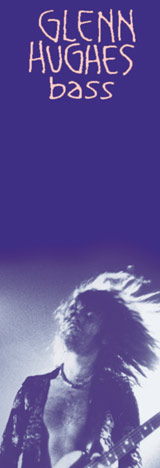 |
Glenn Hughes was born at Cannock, in Staffordshire, on August 21st 1952. He left school at just 15, his sights set on a career in pop music. His first bands were the Hooker Lees, then The News in early 1967. Hughes switched to bass guitar when he joined a better outfit, Finders Keepers, later the same year. They played clubs in the Midlands and cut one single (Hughes did backing vocals on it!). Hughes' singing and bass work was influenced by soul performers like Otis Redding, and the Tamla Motown sound. In late 1968 Hughes, with Mel Galley on guitar and Dave Holland on drums, decided to form their own group. The Moody Blues, one of Birmingham's most successful groups, were setting up their own label, Threshold, and became interested in Hughes' new outfit, now a five piece named Trapeze. Trapeze released their first album in 1970 but quickly slimmed back to a trio. Their second album Medusa was much punchier. Trapeze made scant impression in England but in America, with the sponsorship of The Moody Blues, they built up a respectable following. Trapeze even based themselves in Los Angeles for a time. Their third and final album, You Are The Music, was issued in late 1972 and they began to promote it in early 1973. It was during these shows that Ian Paice and Ritchie Blackmore clocked Hughes live and felt he might fit their concept of a new Deep Purple line-up. He was offered the job. His tenure in Purple saw him slowly add funk influences to the group, and Stormbringer was very much a white soul based rock album. But when Bolin joined, he and Hughes - after a successful start in the studio - began to lose sight of the band on tour. When Deep Purple split Hughes was full of plans, but a short lived reunion with Trapeze ended after a handful of gigs and a guest slot on one studio album. His first proper solo album Play Me Out took a long time to reach the shops and in 1978 this white soul offering was very out of tune with what was happening in the rock scene. The next ten years saw Glenn wrestle with drug addiction, and his recording career was sporadic. A well received rock funk offering with Pat Thrall in 1982 promised much. He also guested on a rock concept album Phenomena, joined Gary Moore for a time in 1985, and even spent time fronting Black Sabbath the next year. Only in the early nineties did Glenn finally sort himself out, first with some Trapeze reunion shows, then a series of often strong solo rock albums. He began touring to promote these and this continues. He has also done a huge number of sessions, and also formed a liaison with Joe Lynn Turner for The Hughes/Turner Project, which has issued a couple of albums and toured both Europe and Japan. |
©
2004 DPAS/Darker Than Blue.
Not to be replicated, reproduced, stored and/or distributed in any way without
prior written permission